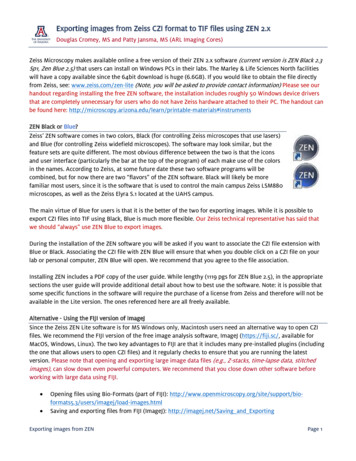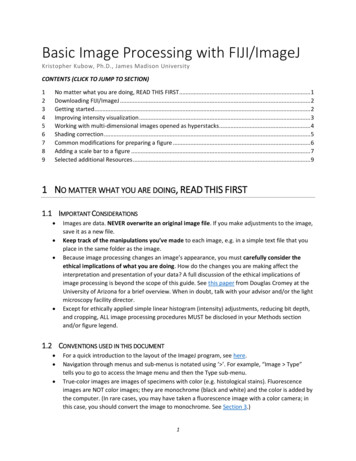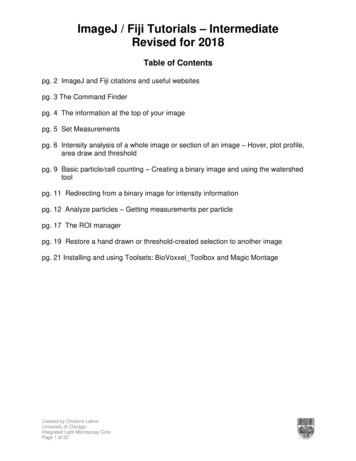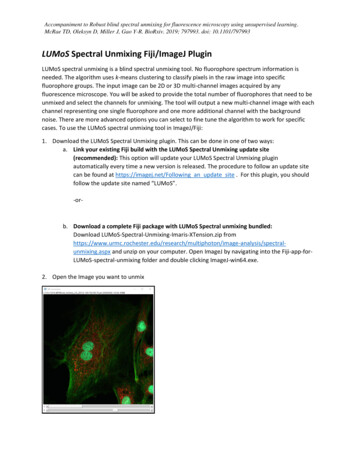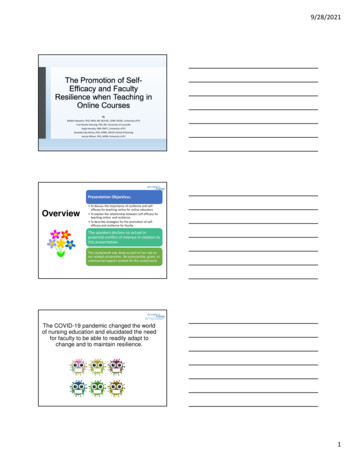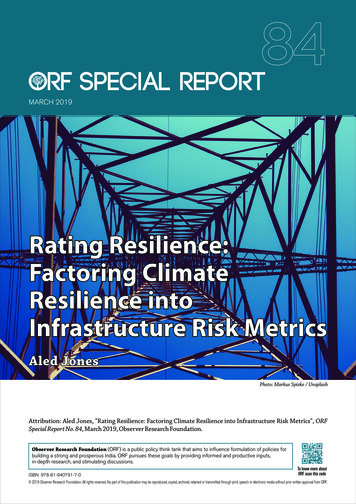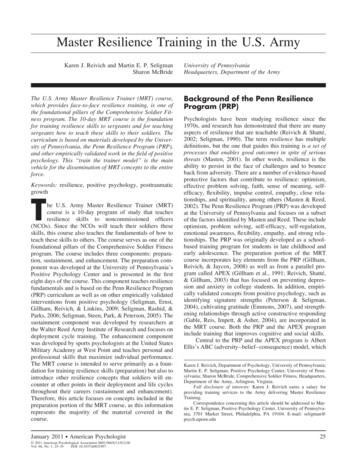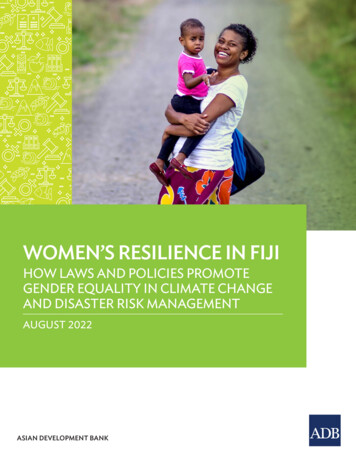
Transcription
WOMEN’S RESILIENCE IN FIJIHOW LAWS AND POLICIES PROMOTEGENDER EQUALITY IN CLIMATE CHANGEAND DISASTER RISK MANAGEMENTAUGUST 2022ASIAN DEVELOPMENT BANK
WOMEN’S RESILIENCE IN FIJIHOW LAWS AND POLICIES PROMOTEGENDER EQUALITY IN CLIMATE CHANGEAND DISASTER RISK MANAGEMENTAUGUST 2022ASIAN DEVELOPMENT BANK
Creative Commons Attribution 3.0 IGO license (CC BY 3.0 IGO) 2022 Asian Development Bank6 ADB Avenue, Mandaluyong City, 1550 Metro Manila, PhilippinesTel 63 2 8632 4444; Fax 63 2 8636 2444www.adb.orgSome rights reserved. Published in 2022.ISBN 978-92-9269-685-6 (print); 978-92-9269-686-3 (electronic); 978-92-9269-687-0 (ebook)Publication Stock No. TCS220337-2DOI: http://dx.doi.org/10.22617/TCS220337-2The views expressed in this publication are those of the authors and do not necessarily reflect the views and policiesof the Asian Development Bank (ADB) or its Board of Governors or the governments they represent.ADB does not guarantee the accuracy of the data included in this publication and accepts no responsibility for anyconsequence of their use. The mention of specific companies or products of manufacturers does not imply that theyare endorsed or recommended by ADB in preference to others of a similar nature that are not mentioned.By making any designation of or reference to a particular territory or geographic area, or by using the term “country”in this document, ADB does not intend to make any judgments as to the legal or other status of any territory or area.This work is available under the Creative Commons Attribution 3.0 IGO license (CC BY 3.0 o/. By using the content of this publication, you agree to be boundby the terms of this license. For attribution, translations, adaptations, and permissions, please read the provisionsand terms of use at https://www.adb.org/terms-use#openaccess.This CC license does not apply to non-ADB copyright materials in this publication. If the material is attributedto another source, please contact the copyright owner or publisher of that source for permission to reproduce it.ADB cannot be held liable for any claims that arise as a result of your use of the material.Please contact pubsmarketing@adb.org if you have questions or comments with respect to content, or if you wishto obtain copyright permission for your intended use that does not fall within these terms, or for permission to usethe ADB logo.Corrigenda to ADB publications may be found at http://www.adb.org/publications/corrigenda.Note:In this publication, “ ” refers to United States dollars and “F ” refers to Fiji dollars.Cover design by Cleone Baradas.On the cover: Mother and child walking along an improved road under the ADB Third Road Upgrading Project in Suva,Fiji. Women in rural remote communities of Fiji are among the most vulnerable groups of people battling climate changeand disasters in the Pacific. Addressing preexisting gender inequalities; improving women and girls’ access to social andpublic services, markets, and education; and employment opportunities are key elements for strengthening women’ssocioeconomic resilience (photo by Eric Sales, ADB).
ContentsTables, Figures, and Boxes ivForeword vAcknowledgments viiAbbreviations viiiExecutive Summary 123ixBackground 11.1 Introduction 21.2 Purpose and Scope 41.3 A National Good Practice Legislative Framework for Strengthening Women’s Resilience to Climate Change and Disasters 51.4 Methodology 61.5 Gender, Climate Change, and Disaster Profile of Fiji 7Laws, Policies, and Institutions Supporting Women’s Resilience to Climate Change and Disasters 172.1 National Structure for Gender Equality and Nondiscrimination 172.2 Gender and Disaster Risk Management 212.3 Gender, Climate Change, and Environmental Management 232.4 Strengthening the Socioeconomic Resilience of Women 28Conclusions and Recommendations 34Glossary 37
Tables, Figures, and BoxesTables1Overview of Observed and Projected Climate and Other Disaster Risks in Fiji 102Summary of the Gender Equality and Nondiscrimination Framework 203Summary of Gender Inclusion in Disaster Risk Management 224Summary of Gender Inclusion in Climate and Environmental Laws and Policies 25Figures1 A National Good Practice Legislative Framework for Strengthening Women’s Resilience to Climate Change and Disasters 62Percentage of People Affected by Major Disaster Events, 1970–2016 83Fiji Labor Force Participation, by Sex 15Impacts of Tropical Cyclone Winston 9Boxes12 Early Experiences of Planned Relocations in Fiji due to Climate Change Impacts: The Gender Dimensions 12317The Essential Concepts of Equality and Discrimination
ForewordThe impact of climate change and disasters is contingent on various socioeconomic factors as well as countrylaws, policies, and decisions by policymakers. Gender roles and social inequalities in access to resources, careresponsibilities, and lower levels of education systematically disadvantage women and girls, rendering them morevulnerable to the impact of climate change and disasters. Numerous reports have revealed the disproportionatelyhigher mortality rates among women and girls during disasters, further highlighting that this area of work requirescloser attention from governments and development partners.*The Asian Development Bank (ADB) works with developing member stakeholders with a shared vision tostrengthen approaches to address climate change and improve disaster resilience through investments in watersupply, sanitation, irrigation, flood control, transport and energy, as well as to enhance knowledge sharing andcooperation with partners in the region. It is understood that a “business as usual” approach no longer works fortackling increasingly complex problems in Asia and the Pacific. A holistic and truly cross-sector and thematicapproach is needed, with gender equality being a central consideration for the effectiveness and sustainability ofclimate change and disaster risk management (CCDRM) actions.The Government of Fiji has long recognized the need for a coordinated and holistic approach that incorporatesgender equality, particularly through the new Climate Change Act 2021 and other recent policy documents, suchas the Ministry of Economy’s Gender Equity and Social Inclusion Policy and Action Plan (2021–2024). Bothrecognize that gender inequality contributes to disproportionate climate change and disaster impacts on womenand that gender and social factors create overlapping and interdependent vulnerabilities. In 2020, Fiji’s Cabinetsupported the introduction of gender-responsive budgeting through pilots run in two ministries. This is a criticalstep to enable the strategic allocation of resources for government priorities in future budgets.ADB has been promoting “integrated approaches” and working to mainstream gender equality and women’sempowerment in operations to support developing members in their efforts to become resilient to climate changeand disaster. Improved gender equality and women’s empowerment turn into positive benefits for many otherdevelopment goals and targets. The ADB Strategy 2030 Operational Plan for Priority Two on Accelerating GenderEquality outlines a clear vision of gender equality as an effective means for achieving sustainable and inclusivegrowth, including in the area of climate and disaster resiliency.This Fiji country report is part of a series of publications that applies the National Good Practice Frameworkpresented in the regional report Gender-Inclusive Legislative Framework and Laws to Strengthen Women’s Resilienceto Climate Change and Disasters, to explore the extent of integration of gender considerations in CCDRM laws,policies, and plans in Fiji, the Lao People’s Democratic Republic, and Mongolia. It was prepared under a regionalknowledge and support technical assistance project on Strengthening Women’s Resilience to Climate Change andDisaster Risk in Asia and the Pacific. The project specifically aims to increase the capacity of these three countiesto develop and advance gender-responsive CCDRM national and sector policies and laws. It also contributes to the*S. Brown et al. 2019. Gender and Age Inequality of Disaster Risk: Research Paper. UNICEF and UN Women.
viForewordwider thrust of the ADB Gender Equality Thematic Group to promote national legislation that supports women’sresilience through gender-inclusive approaches to CCDRM.This report is important as ADB commitments are turned into actions. In light of the increasing complexity ofclimate and disaster risk challenges in the Asia and Pacific region, it adds to the understanding of gaps, as wellas good practices in CCDRM laws and policies, and provides recommendations for moving forward. This reportshould serve as valuable input to support government agencies and policymakers in Fiji to make country laws andpolicies gender-responsive and supportive to women’s resilience to climate change and disasters.Samantha HungChief of Gender Equality Thematic GroupSustainable Development and Climate Change DepartmentAsian Development Bank
AcknowledgmentsThis report is based on work undertaken under ADB Technical Assistance (TA) 9348-REG: Strengthening Women’sResilience to Climate Change and Disaster Risk in Asia and the Pacific. Overall, the regional project objective is tostrengthen the capacity of policymakers in three countries: Fiji, the Lao People’s Democratic Republic (Lao PDR),and Mongolia, and to make climate change and disaster risk management (DRM) policies, strategies, or financinggender-responsive. This Fiji country report on climate change and DRM law and policy frameworks is one elementof the project, and similar reports have been prepared for the Lao PDR and Mongolia.The report was prepared under the overall guidance of Malika Shagazatova (social development specialist) andZonibel Woods (senior social development specialist) in the ADB Sustainable Development and Climate ChangeDepartment (SDCC). Support and contributions were provided by Alih Faisal Pimentel Abdul (TA coordinator),Nalini Singh (national gender consultant), and Ma. Celia A. Guzon (senior operations assistant). Consultants RobynLayton (gender and law expert) and Mary Picard (climate change and disaster risk management/environmental lawexpert) drafted the report. The report was edited by Amy Reggers, gender and climate change consultant.Special thanks to Samantha Hung, chief of gender equality thematic group, SDCC; Sonomi Tanaka, countrydirector, Lao People’s Democratic Republic and former chief of gender equity thematic group, SDCC; and ErikAelbers, senior country specialist, Pacific Subregional Office (SPSO) of the Pacific Department (PARD), for theiroverall support and guidance in the implementation of the TA project.The report benefited significantly from comments by Mairi Macrae and Emma Veve, PARD, and Erik Aelbers,Kristina Katich, and Hanna Uusimaa, SPSO.Special thanks for the contributions of participants in two national workshops in Fiji.
AbbreviationsARCAustralian Red CrossCCDRMclimate change and disaster risk managementCEDAW CommitteeCommittee on the Elimination of Discrimination Against WomenCEDAW ConventionConvention on the Elimination of All Forms of Discrimination Against WomenCEDAW GR37 CEDAW General Recommendation No. 37 on Gender-related dimensions of disaster riskreduction in the context of climate changeDRMdisaster risk managementDRRdisaster risk reductionEIAenvironmental impact assessmentFAOFood and Agriculture Organization of the United NationsFWCCFiji Women’s Crisis CentreFWRMFiji Women’s Rights MovementGBVgender-based violenceHRADCHuman Rights and Anti-Discrimination CommissionIFRCInternational Federation of the Red Cross and Red CrescentILOInternational Labour OrganizationMWCPAMinistry of Women, Children and Poverty AlleviationNCCPNational Climate Change Policy 2018–2030NDCNationally Deter
strengthen the capacity of policymakers in three countries: Fiji, the Lao People's Democratic Republic (Lao PDR), and Mongolia, and to make climate change and disaster risk management (DRM) policies, strategies, or financing gender-responsive. This Fiji country report on climate change and DRM law and policy frameworks is one element
